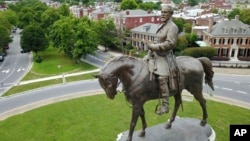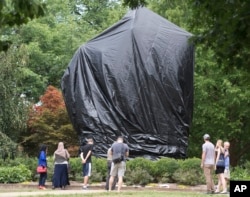A judge in Virginia heard arguments but didn’t issue a final ruling Friday on whether a lawsuit over Charlottesville’s decision to remove the Confederate monument should proceed. A decision that helped spark a violent white nationalist rally.
The judge sided with Charlottesville on some points, removing them from further consideration. But he said he needed more time to study the “main issue,” the question of whether a state law on memorials for war veterans amended in the 1990s applies retroactively, protecting the statue of Gen. Robert E. Lee.
White nationalists descended on Charlottesville last month, in part to protest the city’s plan to take the statue out of a downtown park and sell it. Fights broke out before the rally got started, with attendees and counterprotesters brawling in the streets. After authorities forced the crowd to disperse, a car rammed into a group of people protesting the white nationalists, killing one woman and injuring many more.
Since then, Charlottesville has shrouded the monument, and one of Confederate Gen. Thomas “Stonewall” Jackson, with a black tarp as a symbol of mourning for 32-year-old Heather Heyer.
On Friday, the judge spent hours hearing from attorneys on both sides and asking them questions.
Deputy city attorney Lisa Robertson cited previous case law and an opinion from Virginia Attorney General Mark Herring in arguing that the war memorials law does not apply to those erected before 1997, when the statute was amended.
“It must be applied prospectively only,” she said.
But an attorney for the plaintiffs, who include area residents and the Virginia division of the Sons of Confederate Veterans, said “plain common sense” shows it applies to the Lee statue.
“They didn’t pass this thinking, OK, next year we’re going to build some monument to the Revolutionary War,” attorney Ralph Main said.
The violence in Charlottesville has fueled a re-evaluation of Confederate statues, symbols and namesakes in cities across the nation, accelerating their removal in much the same way that a 2015 mass shooting by a white supremacist in South Carolina renewed pressure to take down the Confederate flag from public property.





